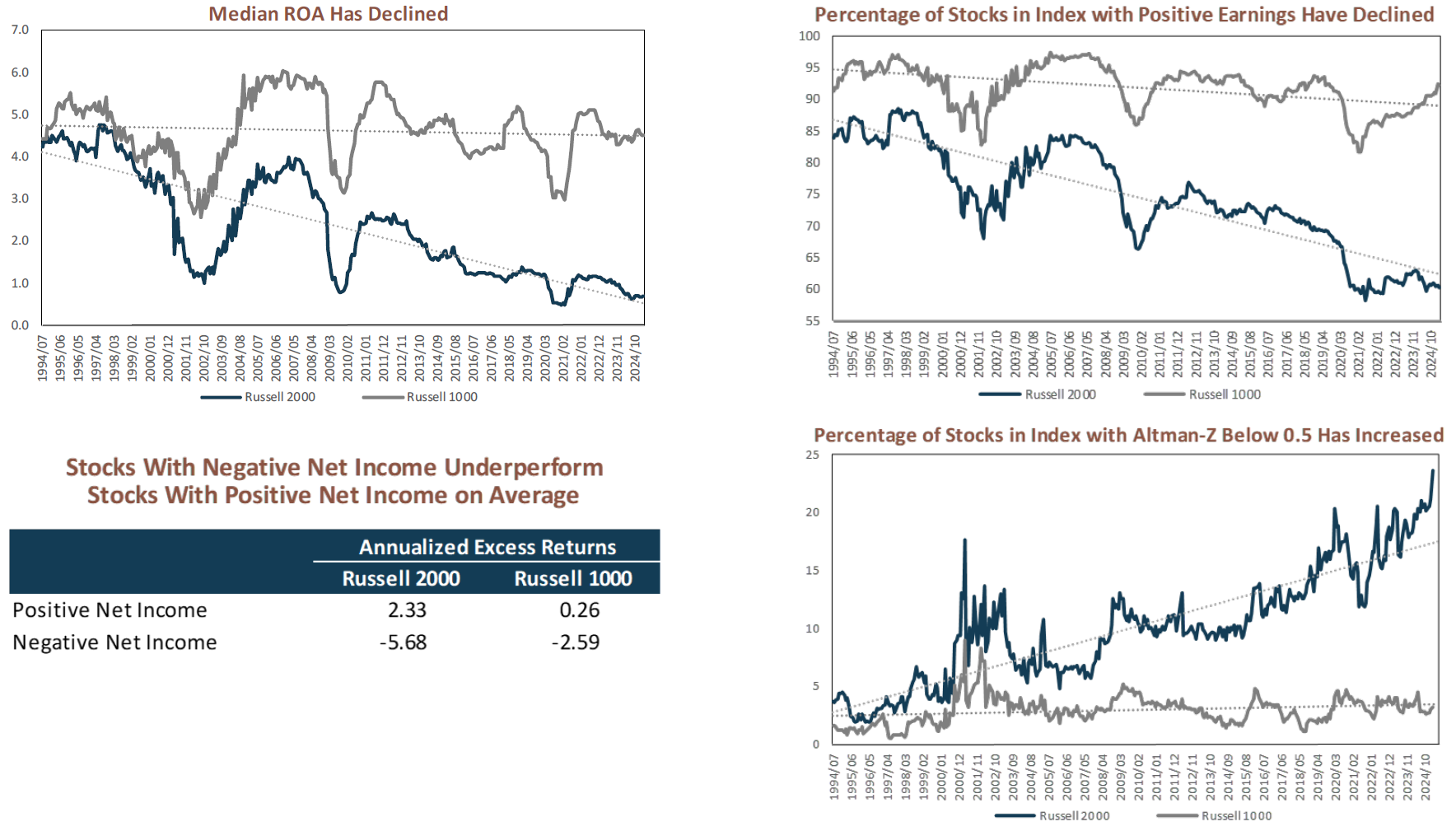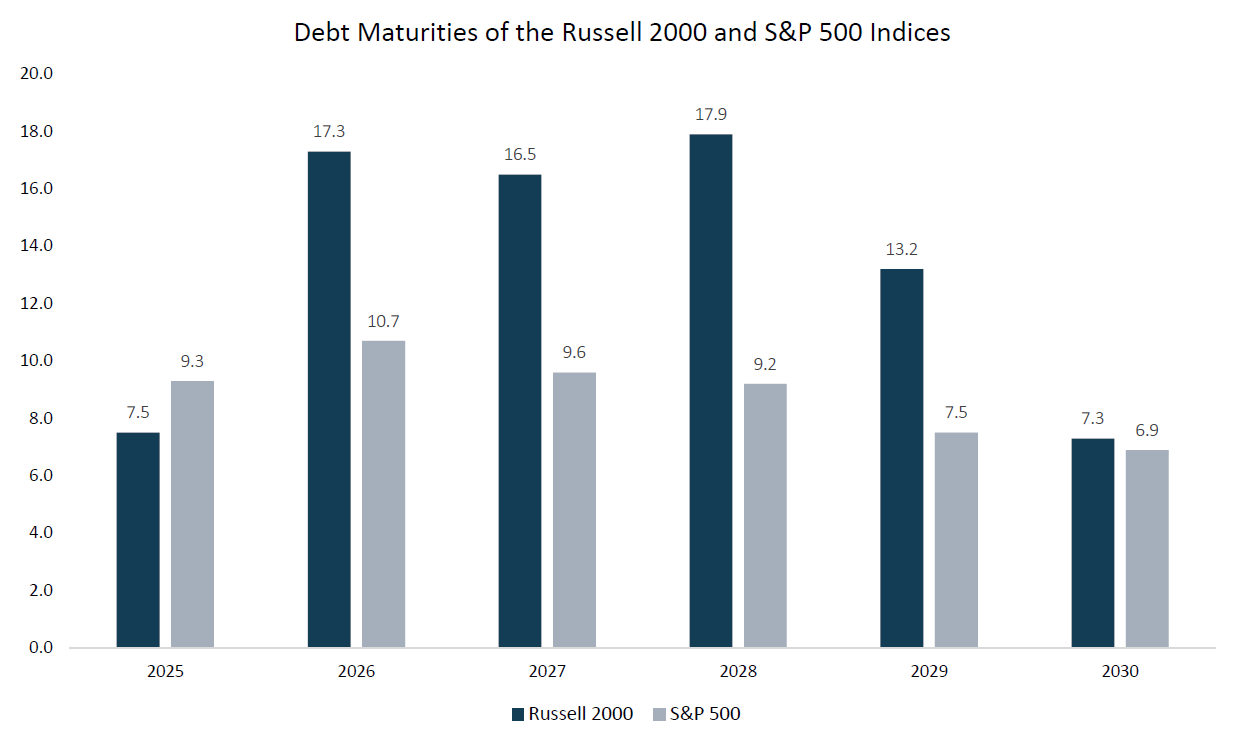Research
Patience Powered by Fundamental Research
The quality of the Russell 2000 has meaningfully deteriorated with nearly 40% of the index constituents being non-earners and close to 25% are at risk of bankruptcy. With $65 billion in zero interest rate era debt maturing in the coming years, refinancing risk is elevated. History suggests investing in companies that generate positive net income not only supports long-term outperformance but may also help mitigate the refinancing risk embedded in the index.
View our full small caps observations for deeper insight.
Quality of the Index Has Eroded
As of March 31, 2025

Quality of the Index Has Eroded
Small cap stocks have a relatively larger share of debt coming due in the next 5 years.
As interest rates have increased since much of this debt was issued, refinancing will be more expensive and difficult for non- or low-earning stocks.

For more small caps observations click here.
For more information on the index and refinancing risk click here.
The opinions expressed herein are those of Aristotle Capital Boston (Aristotle Boston) and are subject to change without notice. This material is not financial advice or an offer to purchase or sell any product. Aristotle Boston reserves the right to modify its current investment strategies and techniques based on changing market dynamics or client needs.
All investments carry a certain degree of risk, including the possible loss of principal. Investments are also subject to political, market, currency and regulatory risks or economic developments. International investments involve special risks that may in particular cause a loss in principal, including currency fluctuation, lower liquidity, different accounting methods and economic and political systems, and higher transaction costs. These risks typically are greater in emerging markets. Securities of small- and medium-sized companies tend to have a shorter history of operations, be more volatile and less liquid. Value stocks can perform differently from the market as a whole and other types of stocks. The material is provided for informational and/or educational purposes only and is not intended to be and should not be construed as investment, legal or tax advice and/or a legal opinion. Investors should consult their financial and tax adviser before making investments. The opinions referenced are as of the date of publication, may be modified due to changes in the market or economic conditions, and may not necessarily come to pass. Information and data presented has been developed internally and/or obtained from sources believed to be reliable. Aristotle Boston does not guarantee the accuracy, adequacy or completeness of such information.
Past performance is not indicative of future results. The information provided in this report should not be considered financial advice or a recommendation to purchase or sell any particular security.
The Russell 2000® Index measures the performance of the small cap segment of the U.S. equity universe. The Russell 2000 Index is a subset of the Russell 3000® Index representing approximately 10% of the total market capitalization of that index. It includes approximately 2000 of the smallest securities based on a combination of their market cap and current index membership. The Russell 1000 Index is a subset of the Russell 3000® Index. It includes approximately 1000 of the largest securities based on a combination of their market cap and current index membership. The volatility (beta) of the portfolios may be greater or less than the benchmarks. It is not possible to invest directly in these indices.
The Altman Z-Score is a financial model that predicts the likelihood of a company going bankrupt within two years. It uses a combination of five key financial ratios to calculate a single score. The formula takes into account profitability, leverage, liquidity, solvency, and activity ratios. An Altman Z-score close to 0 suggests a company might be headed for bankruptcy, while a score closer to 3 suggests a company is in solid financial positioning.
Aristotle Capital Boston, LLC is an independent investment adviser registered under the Investment Advisers Act of 1940, as amended. Registration does not imply a certain level of skill or training. More information about Aristotle Boston, including our investment strategies, fees and objectives, can be found in Form ADV Part 2, which is available upon request. ACB-2506-29


